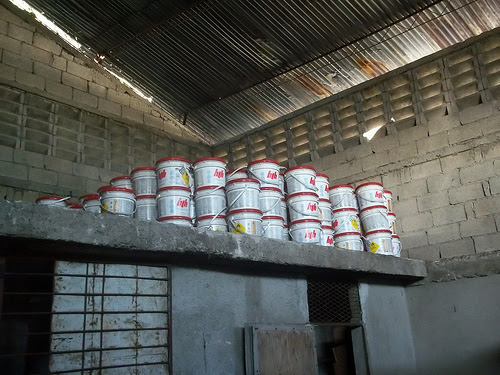The Chlorine Distribution System (CDS) Project
In 2015, International Action will embark on a significant new chapter to build sustainability of our clean water systems through access to a permanent supply of chlorine for the communities we serve. Our major focus for the year will be the launch of our pioneering Chlorine Distribution System (CDS) and the opening of the first Chlorine Distribution Center in Port-au-Prince.
 What is the need?
What is the need?
The chlorinators are easy to use, inexpensive, and very effective at providing communities with clean, safe water. However, as simple as they are to use, people still need to have access to chlorine tablets in order to treat their water. Haitian communities want and need a sustainable supply of chlorine so that continuous access to clean water will be available for many years to come. To provide this assurance, we are creating the CDS.
How does it work?
The CDS will be a network of locally-operated chlorine distribution sites. These sites each have their own water committee made up of locally-elected comunity leaders. Together, they will decide on a donation amount that families will provide for use of the water. Those who cannot afford it will donate a subsidised amount or receive free water. People in Port-au-Prince donate on average 4¢ for every five-gallon bucket they fill. Funds generated from the water sites will be used to purchase the next supply of chlorine tablets from the main Chlorine Distribution Center, who will obtain a large supply of chlorine from a local Haitian business.>
Each community will elect two members to the governing board. All members will have an equal vote on CDS matters and, collectively, they will determine the selling price of chlorine. However, each community will purchase their own chlorine from the Chlorine Distribution Center using funds generated at their local community water stations. Each community will autonomously decide on the donation amount for water according to local economics and demand. Through this model, it has been shown that communities can even generate surplus funds that can be used to purchase other benefits for its people, such as medicine, books, or school teachers.
In this way, the CDS will provide:
1. Improved water quality leading to a healthier population, protected from waterborne diseases.
2. A water treatment program that achieves financial self-sufficiency – measured by routine audits of each distribution system.
 What Have We Have Done So Far?
What Have We Have Done So Far?
Over the past year, International Action has worked to build the foundation of the first Chlorine Distribution Center in Port-au-Prince by securing the funding, completing the necessary construction survey for the building site, and obtaining the support of critical stakeholders, such as the government water agency and community leaders. Following this, we held CDS Board Member trainings in which 20 leaders from 10 communities in the West Department received in-depth instruction on inventory and financial management.
This month, Zach Brehmer, IA’s Executive Director, will meet with the community representatives to officially begin the CDS. Together they will sign an agreement, which will acknowledge their responsibility and committment to the CDS. IA has already agreed to donate one years supply chlorine tablets to the CDS, while enough funds are generated to buy the next shipment of chlorine. IA will also provide technical support the CDS for two years, with advice, expertise and knowledge when required.
The trainings and the success of the CDS will empower these communities to manage their access to clean water and improve the health of their people for many generations to come.
